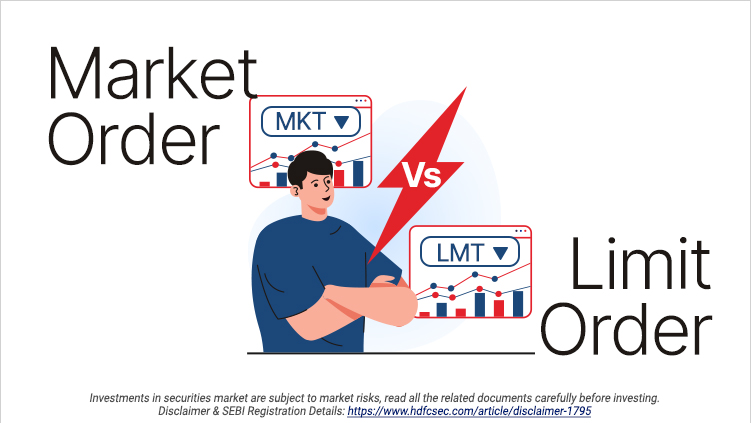Market order vs limit order
Online trading platforms have simplified the processes of trading and investing in the stock market. You could be sitting in your living room or travelling to any part of the world and still continue to place orders for buying and selling securities in the market.
Placing an order is a very commonly used term in the stock market. It means instructing your broker to buy or sell Stock on your behalf. There are two types of orders – market orders and limit orders. Both orders have distinct characteristics. However, many people get confused between the two. If you find yourself to be confused too, read the article, it offers a clear difference between limit and market order that will drive your confusion away.
What is a market order?
When you place a market order you instruct your broker to buy or sell stocks at the best price available in the market at that time. The trade order is executed immediately at the prevailing or live market price. You only have to mention the quantity of shares to be bought or sold.
You should opt for a market order when you are looking to make quick trades on the go as the transaction here takes place instantly. Market orders are the most commonly used orders in the market and are suitable for highly liquid stocks. It is because the number of shares traded is high which makes the buy and sell transactions in these shares sail through seamlessly and instantly.
What is a limit order?
When you place a limit order, you inform the broker about the price at which you wish to buy or sell stocks along with the quantity of the shares to be bought or sold. However, if your specified price is not reached, the order will not be executed.
Selecting the desired price and control over the price at which trades are executed is the major difference between market order and limit order. Another difference is the timing. As mentioned before, market orders are fulfilled immediately. However, limit orders can be executed only when the share price reaches the specified price. By using a stock market app , you can gain a better understanding of stock prices
Moreover, limit orders may be executed partially or may not be executed completely depending upon the available quantity in the counter order. Limit orders also do not guarantee 100% order execution as these are executed chronologically. This is a potential risk that might impact your trading plans.
Some brokers also allow placing limit orders to buy or sell any stocks before or after market hours. The transaction will take place and the order will be executed during trading hours if the specified price is reached. However, if the share price does not reach the specified price during the trading session, the limit order will automatically expire.
Limit orders can help prevent missing a trading opportunity. However, they can also prevent you from realizing unanticipated profits.
Be mindful of your investment requirement and risk appetite when considering market order vs limit order. Keep a close eye on the market and related news to make informed trade decisions.
To place market or limit orders seamlessly, you'll need a trading and Demat account. HDFC SKY by HDFC Securities offers a low-cost platform to Open Demat Account and execute trades efficiently with discounted brokerage.
Related Posts
Don't miss another Article
Subscribe to our blog for free and get regular updates right into your inbox.
Categories
newsletter
 HSL Mobile App
HSL Mobile App 



